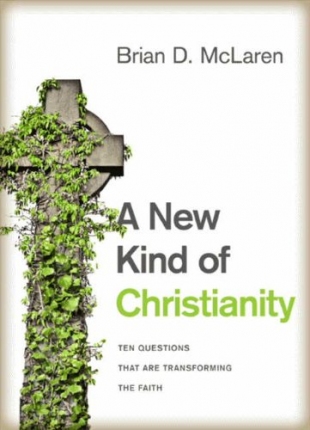Brian McLaren is an author, speaker, pastor, and networker among innovative Christian leaders, thinkers, and activists. He is the author of A New Kind of Christian, The Secret Message of Jesus, and Everything Must Change and is profiled as one of our Living Spiritual Teachers. McLaren has been named as one of America's top 25 evangelicals by Time magazine. In the preface to this bold and imaginative new work, he states: "The bad news: the Christian faith in all its forms is in trouble. The good news: the Christian faith in all it forms is pregnant with new possibilities."
McLaren grew up attending conservative Evangelical churches and during his teen years participated in the 1970s Jesus movement. He married a Catholic woman and started a little house church which grew into a large and active community of believers comprised mainly of spiritual seekers from the "nonchurch majority." During the 1980s and 1990s, McLaren was alienated from the fundamentalism of Protestant and Catholic leaders who were aligned with a neoconservative ideology and advocacy of a "cultural war." On the other side arose "the emergent church movement" with its rebirth of religion in a postmodern context. And McLaren is its primary spokesperson. In this book, he calls for a new reformation with a 96th thesis to be added to Martin Luther's 95: "We need more than a new static location from which to proclaim, 'Here I stand!' Instead, we need a new dynamic direction into which we move together, proclaiming 'Here we go!' "
McLaren's quest for a new kind of Christianity begins with a prayer where he asks for wisdom for the journey ahead. Each chapter explores a significant question and a biblical theme or person that offers "a passage out of our conventional paradigm and into new territory, new possibilities." He begins with "What Is the Overarching Story Line of the Bible?" and rejects the Greco-Roman narrative model based on a six-line scheme of perfection, fall, condemnation, salvation, and heavenly perfection or eternal perdition. In its place, McLaren suggests a Bible narrative of human foolishness and God's faithfulness. Another way to look at it is to emphasize the story of goodness being created and re-created.
In "The Authority Question," McLaren states that rather than regard the Bible as a legal constitution, we should consider it as a community library "that preserves, presents, and inspires an ongoing vigorous conversation with and about God." The two questions "Is God Violent?" and "Who Is Jesus and Why Is He Important?" revolve around the man from Nazareth. In the first, he is a mirror in which we can see the character of the living God and in the second, he is one offering messages about poverty, slavery, and a social agenda. McLaren concludes this first section of the book with an affirmation of Paul's understanding of Jesus and the kingdom of God in "What Is the Gospel?"
The tire hits the road as the author zeroes in on major flaws, rigid doctrines, and divisive practices in his discussions of questions related to the Church, Sex, the Future, Pluralism and What-Do-We-Do-Now. In these chapters, McLaren considers the "spiritual but not religious" phenomenon, the church as a school of love, the prospect that gay folks may help the rest of us come out of the closet regarding our sexuality, an eschatology of hope to replace the traditional one of determinism and acquiescence, the challenge and the adventure of relating to people of other religions, and the quest to unify and liberate what we have divided and conquered. The author sees this quest as one beyond survival, security, power, independence, individuality, and honesty. It is a quest for sacredness, "a desire to live in a growing conscious awareness of the presence of God and the goodness of God reflected in all things."
Brian McLaren has already faced a wide-ranging campaign against him and his vision of a new kind of Christianity from conservative groups. He has taken this in stride and even been able to learn something from those who consider him a heretic and an enemy of "the true faith." McLaren has some suggestions for those who want to engage their religious communities with the ideas and questions contained in A New Kind of Christianity.
We've been very impressed with what is coming out of the Emergent Movement, and we welcome the prospect of its growing momentum as more and more seekers find a spiritual home that speaks to their faith, openness to other religions, need for practice, and passion for mending a broken world. Certainly McLaren's books, lectures, and buoyant spirit provide a light to show the way into the hopeful and holy future!
